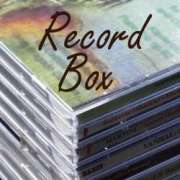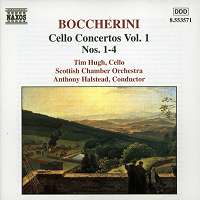SPARKLING MOMENTUM
DAVID WILKINS listens to Tim Hugh's Boccherini
NAXOS 8.553571
|
 |
|
Opportunities to sing yet another hymn of praise to the continuing
delights of Naxos super-budget issues come thick and fast. Not only for
the adventurousness and seeming inexhaustibility of the repertoire but
also for the championing of younger artists of significant talent.
Cellist Tim Hugh has recently impressed me greatly on this label with
recordings of Holst's Invocation (8.553696) and a Walton Cello Concerto
(8.554325) that must be ranked as one of the finest available. Now he begins
a series of the complete Boccherini concertos with engaging performances
of four (numbering is a matter of some dispute) of these attractive Haydenesque
works.
 Although
he is accompanied by the Scottish Chamber Orchestra playing on modern string
instruments, respect for historical performance practice is guaranteed
by the presence of period specialist, Anthony Halstead, as conductor. Speeds
tend towards the brisk (though never the breathless) and fairly light articulation
keeps the sound fresh and entirely 'stodge'-free. Although
he is accompanied by the Scottish Chamber Orchestra playing on modern string
instruments, respect for historical performance practice is guaranteed
by the presence of period specialist, Anthony Halstead, as conductor. Speeds
tend towards the brisk (though never the breathless) and fairly light articulation
keeps the sound fresh and entirely 'stodge'-free.
Each of the concertos lasts a little under twenty minutes and is in
a fast-slow-fast, three movement format. They are not as great as the two
Haydn concertos but full of charming invention, virtuoso display and tender
delicacy. Those who, like me, first encountered the Boccherini cello repertoire
through the advocacy of Jacqueline Du Pré might, at first, find
Tim Hugh a somewhat restrained soloist. He certainly eschews grand rhetorical
gestures and is modest of manner but not of means. Rapid high passagework
never threatens his technique or intonation. There may be moments when
the sound picture is more chamber-like than concertante but the result
sounds entirely apt.
In the first C Major work (G.477) for example, the Largo is played with
baroque-like stateliness and the restraint brings a rather special feeling
of pensiveness. In the most familiar of the slow movements - that of the
G Major concerto (track 8) - Hugh opts for inwardness rather than heart-on-sleeve
emotionalism and the music is all the better for it.
There are, of course, moments when the soloist sings out a prouder statement
in more full-bodied tone. The opening Allegro moderato (and the 'moderato'
marking is not ignored, I was delighted to find) of the other C Major concerto
(G.481) shows that he can be a big-voiced instrumentalist when he feels
that is justified by the material. All of the finales skip along with the
kind of sparkling momentum which makes foot-tapping so hard to resist.
Two more volumes to come I guess, and, on this evidence, should be keenly
anticipated.
Copyright © 15 March 2000 David Wilkins, Eastbourne,
East Sussex, UK

PURCHASE
THIS CD FROM AMAZON (and listen to sound extracts)
PURCHASE
THIS CD FROM CROTCHET
<< Music &
Vision homepage
Nicholas Maw >>
Record Box is Music & Vision's regular Wednesday series of
shorter CD reviews
|